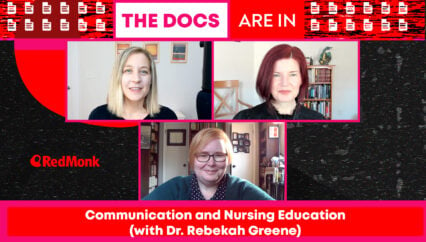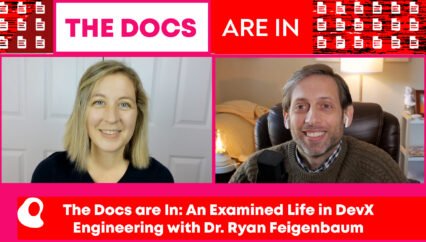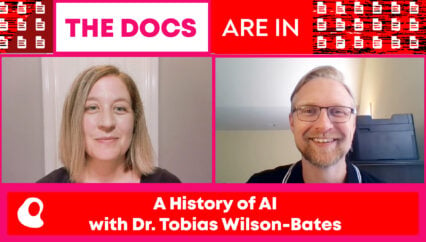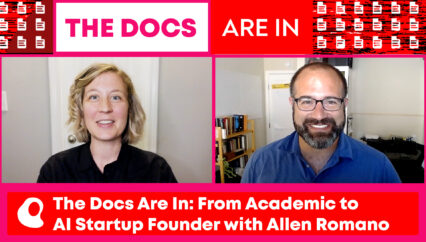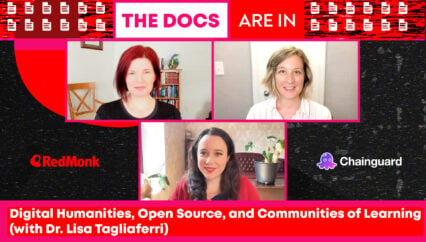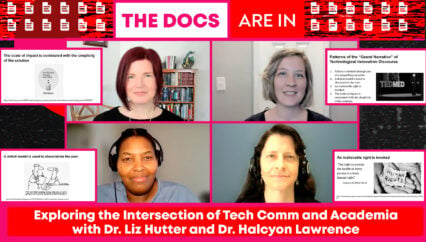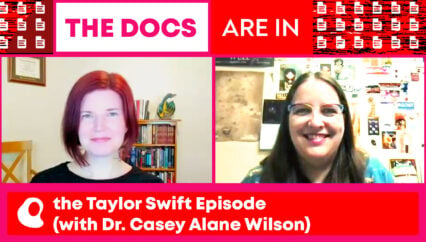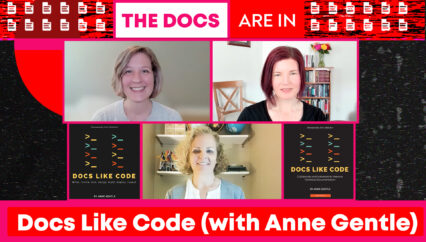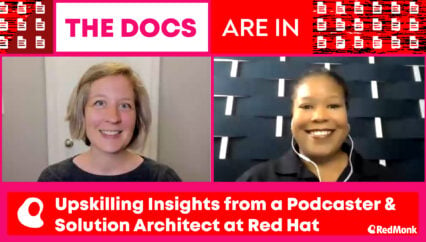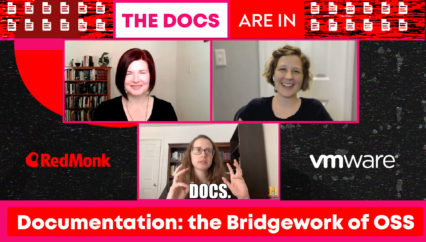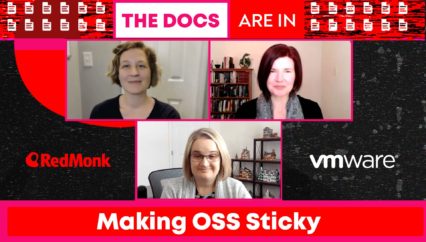Chief Cloud Economist Corey Quinn and his team at the Duckbill Group help their clients control their spend with cloud providers such as Amazon Web Service (AWS). Corey has also amassed an impressive following across different media platforms, including his newsletter, podcast, and socials such as X (fka Twitter) and LinkedIn. In this DAI episode, Corey joins Kate and Kelly to discuss his communication style (best characterized by terms such as “snarky” and “$#@!posting”), his vehement support of technical documentation, and why you want to hire well if you hope to get to 500 podcast episodes.
This was a RedMonk video, not sponsored by any entity.
Resources:
- Learn more about the Duckbill Group: https://www.duckbillgroup.com/
- Last Week in AWS (Corey’s newsletter): https://www.lastweekinaws.com/
- Screaming in the Cloud (Corey’s podcast): https://www.lastweekinaws.com/podcast/screaming-in-the-cloud/
- Find Corey on X: https://twitter.com/QuinnyPig
- Find Corey on LinkedIn: https://www.linkedin.com/in/coquinn/
- 826 National (a non-profit supporting young writers): https://826national.org/
Rather listen to this conversation as a podcast?
Transcript
Kate Holterhoff: So hello and welcome to this episode of RedMonk’s The Docs Are In. I am Kate Holterhoff, analyst with RedMonk, and with me is my Docs Are In co-host, Kelly Fitzpatrick. From the beginning of this video series, Kelly and I have been plotting ways to entice our guest to participate on an episode, because when it comes to communication with technologists, few lights of this industry can rival. Chief Cloud Economist with the Duckbill Group and longtime friend of RedMonk, Corey Quinn. Corey, thanks for joining us today.
Corey Quinn: Of course, although I think the theme of this episode with Kate, Kelly and Corey is obviously alliteration.
Kelly Fitzpatrick: Yeah, bring all of your, I don’t know, like if that’s an English major reference, but it’s definitely, it is AN English major reference.
Corey: I can hang, I definitely know my consonants from my assonants.
Kelly: Oh my goodness. So, okay, at the risk of going too English major on something and destroying something by overanalyzing it, kind of want to talk a little bit about how your communication strategy, especially with technical audiences, is so very effective. And you have a very particular style, and the way that you kind of describe yourself on LinkedIn is kind of snarky, and you use the term shitposting on the platform formerly known as Twitter.
Without having to necessarily define all of these terms, which you certainly can do, I think what we want to know is what makes the tech industry and cloud in particular so well suited to your snarky takes on the world?
Corey: Quite simply because I know what I’m talking about in that industry. I’m far from unique on this. You have Matt Margolis and Alex Hsu doing this sort of thing in a bunch of places over in the legal profession. The problem is if I start shitposting over about legal concepts, my not being a lawyer is going to have that wear thin pretty quickly because at that point you’re forced to give into stereotypes and the rest. Here in the cloud industry, I’m working with this stuff day by day. So step one, know what you’re talking about is sort of important on this.
And as for the rest of it, my theory of adult education has always been that if you need to teach someone something or get them to pay attention, you have to grab that attention first. My approach has been humor, though there are others. And for a lot of very good reasons, most people don’t lead from the perspective of humor. They’re trying to sell things to customers who don’t wanna feel that they’re trusting their infrastructure to clowns, for starters. You’ve got a lot of corporate humor just lands flat. And when you do the snarky, sarcastic thing that I do is, John Scalzi famously wrote repeatedly that the failure mode of clever is asshole and you’ll hurt people’s feelings. And the only way through that is to be very careful, learn from what you’re seeing others and sometimes yourself get wrong and don’t make the same mistake twice. It’s a perilous path and you can do a lot of damage if you’re not very intentional with how you do that.
Kelly: I think that’s a good point. Like this is not an easy thing to do. Like shitposting, there’s like this very fine line. And I feel like you fall on one side of it and it’s, again, no one will take you seriously. You fall on the other, you’re hurting people’s feelings. So it’s definitely a very, I think it’s one of those things where it’s a lot more difficult to do than people think.
Corey: Very much so. And I will point out when people think that sometimes I’m just out there telling jokes that have no basis in reality. Okay, but if that were true, no one would listen to what I’m saying. Instead, it feels almost like the stand-up observational comic approach of where you say something that’s edgy and ridiculous and humorous and the audience is, yeah, he’s right! And here we are.
Kate: So you equate yourself to a stand-up comedian.
Corey: On some level, yes, except stand-up comics rehearse what they’re doing and they workshop their material and find it. And I just basically shoot from the hip.
Kate: You’re just winging it.
Corey: Yeah, so they’re good at it. I’m just more or less… but I make up for it the same way I do with programming. I’m not a good programmer either, but it turns out that brute force and enthusiasm pair super well.
Kate: Well, I think the world could use a little more snark. So I feel that calls for a story time though. Has there been an irreverent comment that has ever backfired in your history? And I guess maybe we can make this into a learning opportunity, you know, what was your takeaway from that? How do you retain that sort of critical tone without sort of degrading your guests and making everyone feel bad?
Corey: It backfires, but the backfires tend to be more minor and less damaging and more amusing with time. A few weeks ago, I wound up checking the box, filling out the parent card they sent home every year when my daughter started first grade of languages spoken at home. And I wrote down English and sarcasm, because of course I did. And then I started getting emails about resources available to bilingual households. And oh dear, I feel like that one went a bit in the wrong direction. Wasn’t quite where I intended to go, but okay. People didn’t wind up getting hurt from that one as best I’m aware.
In the corporate sense, it’s less of a concern, where I will periodically make fun of Gartner Magic Quadrant results and dunk on all the companies involved. And I’ve gotten strange outreach from a lot of the companies named in that, such as, why didn’t you dunk on us? How do we get you to dunk on us? Can we pay you to dunk on us? And that’s always a strange feeling.
Other times it’s a, well, you’re making a lot of snarky comments about our product and we’d like to educate you about why that’s not true. And what they’re not always expecting, well, especially the companies I dunk on repeatedly is, for I don’t know, for 10 years now, I’ve been your customer. I am not making this up because I saw some cool kids doing it on television or something. This is based upon my lived experience. And I’m thrilled to sit down and explain to you what that customer perspective is, but you’re not gonna argue me out of it. It’s useless to try. Just because even if you manage to change my position on it, I am just saying what lots of people are thinking, but usually are too polite to say in a business context.
Kelly: I think it’s comforting to me to know that you are also getting well actually’d from people that you run into, that it’s not just —
Corey: The corporate well actually is very interesting. It’s a little bit less insulting, generally speaking, than it is when you have the reply guys on Twitter or whatnot.
Kelly: Yeah, I can imagine that very much. But it has been nice to also know that you’re in demand. You have people wanting to know why you’re not dunking on them.
Kate: For sure.
Corey: Right, so people are like, why don’t you give our cloud provider a try? Like something that just launched yesterday. It’s because there are only so many hours in the day. And what people often miss is being an internet clown is not my only use of time during the course of the day. We are a consultancy. We do have customers with whom I have in-depth conversations and well, yes, I’m still me and I bring my personality. It’s, “okay, those jokes were very funny, but our AWS bill is still sky high. Could you maybe get to the point” is not a good comment to have in one of those meetings. You have to drive to an outcome when you’re advising customers when they’re paying you for that advice. Not all laughs. Sometimes there are tears.
Kate: Yeah, when I think about ways that I’ve counseled some vendors to generate effective outreach to developers, I usually cite books like Adam Devander’s Developer Marketing Does Not Exist.
And I don’t know that he has shitposting included in there, but it does seem to be particularly effective. But I think what it does do is signal the expertise that you bring to these conversations. And that tends to be accompanied by a sort of critical lens. Taking the medicine with a spoonful of sugar seems to be the joy of having the humor tied up in it.
Corey: All things in moderation. There are a number of people that I love working with. They’re great conversationalists, they’re great friends, but it seems like they view picking fights on Twitter, historically, to be their primary means of outreach. And I very rarely these days will wind up calling out individual companies, demanding a response for something that isn’t egregious. It’s a, I’m not there to argue with people. I’m there to express a point of view, not wind up basically, having 18 deep reply threads going back and forth, because at that point it’s performance. You’re not going to change anyone’s perspective in 280 characters in like an eight level reply thread. You’re just, it’s okay. We don’t agree. Let’s move on because otherwise people are going to think that my job is arguing with idiots.
Kelly: And I think that’s actually a really good segue into my next question. So your job is cloud economist, and you were not a full-time shit poster. You actually have a real full-time job, yet so much of what people see that you do, that’s like the visible part, has to do with communicating on all of these different platforms, and to your point, even to different audiences. And by the way, one of the things that I love is you often use your platforms for good. So, for instance, relevant to the Docs Are In, you are a champion of good technical documentation. One of the things I love is like, I’m scrolling through say my platform formerly known as Twitter feed, and I see you calling out either, someone has really good documentation or bad documentation. And also you run a yearly charity t-shirt drive that benefits orgs like 826 national, which is the 2022 shirt that I have on now. It’s an organization that supports young writers. Like I do, I love that you use your platform for good, but like with all those different platforms and all those different audiences that you’re trying to reach, how do you tailor your snark to fit all of these kind of different situations?
Corey: Good question. The answer is basically I shoot from the hip on all of these things. I don’t sit here with a content calendar. I had half an hour before this recording and I wrote three-quarters of the rough draft of a blog post. It’ll go up probably in a month. And it’s when the inspiration strikes I go with it. I’ve also done a fair bit of automation and process management here at the company. There are other people who work here. They are, if you look at our about us page, we have I think what are we seven people now. The other six do not sit and clap as I do all the work, I assure you.
I write all of the content myself. I’m not outsourcing that. This is not a chat-jippity story where, oh, I’m gonna just basically send out nonsense I haven’t reviewed under my own name. But anything that doesn’t need to be me is often not. I have an editor who edits a lot of my stuff because I’m bad at self-editing. I have people who wind up scheduling the newsletter, setting up the sponsorships, making sure, running it through a series of reviews and the rest.
For example, I have a podcast, Screaming in the Cloud, an interview show, we are about to hit 500 episodes. And I’ve never done audio editing on any of these things. I don’t know what I’m doing there. Paying professionals who do has always been the right path there. But I need to have the conversation, but I don’t need to handle the ins and outs of scheduling, of getting the headshot from them, getting the bio, all of that. I have processes built around me that handle this. So anything that doesn’t need to be me explicitly doing these things, I’m going to pass off. I’m also ADHD personified. My particular expression of it means that I’ll do a recording and then the recording sits on my drive for six months because I forget to upload it. I don’t have to think about that now. That stuff has just been automated away from me. It leans into the things I’m good at and gets me around the things that I’m terrible at.
Kelly: I like how I ask you how you do something and you automatically are like just basically distributing credit to your team.
Corey: Hire people who are good at things and get the hell out of their way.
Kelly: Hire people who are good at things. Yes. Like very, very much so.
Corey: And that’s always been a challenge to me. I don’t have any direct reports, for example. And part of that is because my philosophy of management has always been that when things go well, credit goes to the team. When things go poorly, that is your fault, you own that. And the nature of what I do and how public I am feels like there’s no way to get away from, as soon as I start managing people, it’s not about publicly take credit for all of the things that you do. That’s not how you manage people. I know this because I have worked for people who do.
And it was some of the worst employment experiences I’ve ever had. I am not going to make people feel that way, even though that is the job. I can’t reconcile that. So I opt out. I have no directs, except strangely, our CEO. And business partner.
Kate: All right, so AWS, the clearest target of your snark, you know, in the cloud space and just in general. You know, in terms of market share, this makes a lot of sense. However, I’m wondering if there’s something else that we can dig into here. What was it that made AWS stand out? Is it something about the brand, something about the culture? Why does ridicule in this sort of humorous tone really fit the AWS persona and how do other cloud providers sort of stack up in terms of, should we call it the shit splatter range?
Corey: It started off because that’s the company that I have the most experience with and that’s where I do the consulting work in, but it turns out that most people don’t complain publicly about their giant AWS bills because at publicly traded companies, that’s how you get removed from your position. So I need to be noisy enough in the top of the mental SEO stack for people to find me. And humor was my way of doing that. I am helped by the coincidence that AWS, more so than a lot of other companies, is deeply and profoundly unfunny.
They take themselves far too seriously. And let me be clear on this. Their customers need them to take business seriously. You can’t be out there like you’re the Wendy’s Twitter account joking about an outage that just caused customers harm. That’s how you get slapped hard. I am not suggesting that, but they treat everything with that same corporate voice where as companies get significantly large and everything turns away from getting attention to downside risk mitigation, that’s not funny becomes the unofficial motto of their marketing departments, which means that they’ve basically cleared the field. In many cases, some of the best mockery of large companies, AWS being no exception to this, is simply repeat back word for word exactly what they have said with slightly different intonation or slightly different context, because they always speak in a marketing tone of voice. Let’s be very direct. If I spoke to human beings in person, the way that marketing speaks to people collectively, I would spend an awful lot of time getting punched in the mouth. And I’m not sure people would be wrong to do it. Because when you unpack the subtext just a little bit, it is profoundly condescending. It is, we are the experts in anything that we talk about, and there’s always an inherent lack of disingenuity that expresses it. Because as a marketing department for a company, I can say what we’re offering is good, I can say what we’re offering is great, or I can say nothing at all, because I can’t say, okay, this particular aspect of our product, it’s not terrific, because then the wolves are at bay and you have to deal with keeping them from your throat just a little bit. What I have is the authentic aspect of, okay, they say that this thing is good. It actually is. A lot of what AWS does is great, the price performance of Graviton. I was skeptical when it came out. It’s awesome. S3, modern Marvel of the world, but there’s a lot of other stuff that is a little bit less baked up.
Bedrock most recently. They’ve been talking about that at length for months and they’re having stories of people using it in production, but it’s still in private previews, so most customers can’t use it. Anyone who can is under deep NDA. So how do you square that circle of, it’s not available for general use, it’s still in preview, but we’re using it in production. Now you’re the one that sounds irresponsible. What’s the deal here? And just pointing out that gap is the area where a lot of humor and customer awareness starts to come from. My personal favorite emails that I get in response to my email newsletter has been, “‘Love the jokes and also you make a really good point.’ That makes me think of this other point. Have you considered that?’ And often the answer is no, that’s actually really insightful. Let’s talk about that some more. I learn from the people I talk to.
Kelly: Yeah. And it strikes me that you’re almost doing literary criticism, but you’re pointing out the gaps in — we both have literary backgrounds and the ways that we’re taught to read text, we’re kind of doing that but with, you know, cloud offerings, which I think absolutely fascinating.
Corey: It’s a weird combination of skill sets. I won’t deny that. One of the reasons I build so many demo apps and then tear them to pieces with different services is I always feel that I’m maybe a quarter or two away if I stop building things myself from not knowing the subject matter that I’m talking about. And then I become a talking head where, okay, this product is bad because other people say it’s bad or this product is good because marketing has paid me to say such a thing and then you lose all credibility with the audience. And that is the kiss of death. The reason that people believe what I say is because I believe what I say.
Kelly: Yeah, and you absolutely do. You have the tried things out, I think, kind of cred to prove it. Like, so many things I hear you talk about, you’re like, well, I was using this, and this was my experience. And those are the types of things where it’s difficult to fabricate that, right? It’s like you really have to do it in order to have that experience and talk about it in that certain type of way.
So I wanna talk a little bit about Screaming in the Cloud because as you noted, you’re hitting your 500th podcast episode. I don’t think I’ve done 500 anything like ever in my — so I think that’s very significant.
Corey: Showers, hopefully.
Kelly; Yes! I’ve had 500 showers, 500 cups of coffee…
Corey: I’ve only taken seven so far. It’s turning into a year where I might need to get up to number eight soon. We’ll see. No, no.
Kelly: But like 500 podcasts, and you have been kind enough to host Kate and myself and some of our other RedMonk colleagues as well. We’ve all had just fabulous times on your show. Any advice that you have on folks who are doing their own type of podcast hosting. You’ve described your hosting style as slings and arrows, which is very appealing to the kind of Shakespearean reference appeals to, again, literary folks like Kate and I. But for folks who want to emulate your style, any advice for those, or conversely, folks who are perhaps guesting on a podcast or other type of interview type series where they might have to work through around some particularly critical takes.
Corey: One of the things that I think is not fully understood by a lot of guests when they start the recording process with me is that they don’t need to build a show note thing. I haven’t thought much about — I invite someone on and they book it out, they fill out the form. The next time I think about that is when we start having the conversation. I book an hour for a half hour recording and I ask them just a couple questions at the beginning to align the conversation, but it is a conversation. What I think a lot of podcast hosts get wrong or attempted podcast hosts get wrong is you have exactly one job, and that job is to make your guests look great. This is not journalism when I do it. I don’t pretend it is. One of the three big questions I ask is, what topics do you wanna make sure that we don’t talk about? Because otherwise, you’re putting people on the defensive. If you have someone who works for a big company and they show up, let’s say from AWS, and my first question is about your return to office policy or your anti-union busting stuff in the retail side of your arm.
I know a couple of things. One, they are not going to give me an answer. And anything is beyond the standard talking point, because they’re of course not allowed to speak to that particular topic. Two, it’s going to put them on the complete defensive to the point where they might shut down and I’m not going to get anything useful out of them. And three, it’s going to occlude the actual thing I brought them on the show to talk about, the thing that they are passionate about, that they are an expert in. And that’s sort of the secret is that if you find someone who’s passionate about something that they’re working on and get them talking about it, it’s very difficult for a conversation with that passionate person not to be interesting and not to lead down interesting paths. One of the rules I’m breaking right now as well as being on a guest is try not to go more than 30 to 45 seconds. People don’t like to listen to monologues forever. It should be a back and forth conversation with people.
And the rest of it’s just practice. I was scared to death for the first 36 episodes or so that I wound up putting out when I was recording them. And then I realized, wait, I’m the one with the microphone. And at this point, no one is gonna hit me with something on the show that I am not going to be able to feel or handle. Even for this, you said, right, you asked me some questions. You don’t need to tell me in advance what you’re gonna ask. You’re not gonna hit me with anything that is going to completely come out of the blue and make it difficult for me. That’s the trick. You make this very welcoming. You’re on the right path.
Kelly: That is good to know. And I think with that, that’s probably a good point for us to kind of wrap up so that we’re not dragging this out for the two hours that we probably could. Corey, thank you so much for joining us today. I know you have such a busy schedule.
Corey: No, by all means, it’s always a pleasure to talk to people who are interested in aspects that most folks don’t see. You talked earlier about me being passionate about documentation. That’s a particular area of focus for me, because the failure mode of documentation is not your documentation is crap. It’s I’m an idiot, no one bothered to tell me this before. It’s not the docs are bad, it’s that I’m not smart enough to use the product in the way that it’s intended. And that’s terrible.
I still fall into that trap when I know for the fact that I’m not the most ignorant person in any given universe where I am not the dumbest man in the world to ever try to use this database. And the fact that I don’t understand it means that I am very far from alone. For some reason, people are reluctant to raise their hand and say, I don’t get it, like Tom Hanks in Big. It’s the same approach here. I don’t understand why this is important or what matters. And so very often you’ll find when you start talking to people, they don’t either, and they’re hoping no one noticed.
Kelly: And I think almost dovetailing, it’s like being a good podcast host and having good technical documentation, like similar age, you want people to be the best version of themselves.
Corey: Absolutely. It’s important from my perspective to remember the human on the other side of it. No one except maybe who’s responsible for corporate comms for Microsoft security issues shows up at work hoping to do a terrible job today. People are operating largely in good faith, and when they’re doing that, that doesn’t mean you don’t say that, okay, your effort on this is insufficient and your outcome is bad. You can do that, but don’t malign them personally. It’s not you did this because you don’t respect the customer. No.
There are always constraints that you don’t see. I try not to assign motives for folks on this. But also don’t publicly get up there and speak like everyone doesn’t get it is somehow a fool. That’s what gets my back up.
Kelly: That makes a lot of sense, and I think that’s definitely a good note for us to wrap up on. Corey, thanks again for joining us, and with that…
Corey: We need to kill this, because otherwise you’re gonna start insulting too many people that we do business with. Good lord. I get that a lot, don’t worry.
Kelly: No, we can edit, but like I don’t think we’re gonna have to edit any of this, which I think is gonna be great. But with that, Docs are Out.
